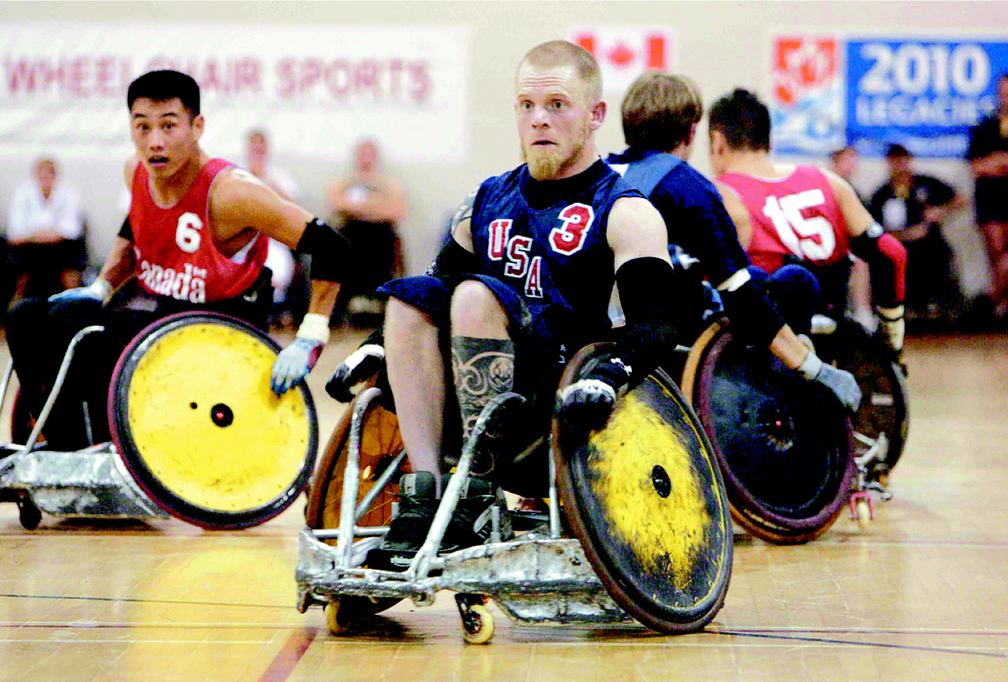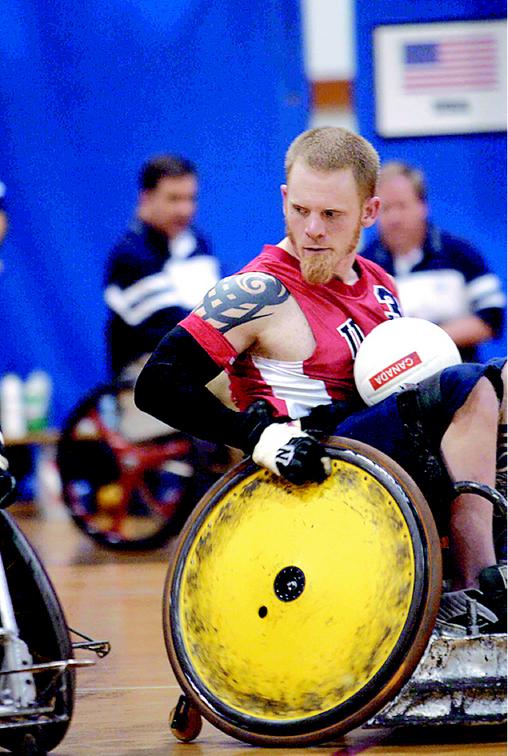Murderball would seem to fit squarely into the “inspiring” category. The film introduces viewers to members of the U.S. Paralympic Team's quad rugby squad. This hearty group of can-do quadriplegics are star athletes, competing for gold medals in a worldwide sporting event. That sounds awfully inspiring, doesn't it?
Well, what sets Murderball so far ahead of the pack is that it never tries to curry sympathy for its subjects or exploit them in a sentimental bid for tears and smiles. In fact, it would be pretty hard to use these guys for something as wussy as that. Hell, there are times when these guys are total jerks–God love 'em.
Filmmakers Henry Alex Rubin and Dana Adam Shapiro have found themselves some seriously hard-ass subject matter. Originally called “murderball” before some wise publicity flacks decided that “quad rugby” would sit a little easier with sponsors, the sport consists of quadriplegic jocks (most of whom have suffered broken necks) strapping themselves into battered wheelchairs that look like a cross between the chariots in Ben Hur and the cars in Mad Max and bashing into one another in a brutal, full-contact game of Australian rules football.
Equally rough-and-tumble are the players on which the film focuses. Mark Zupan is a beefy, multi-tattooed dude who is his fringe sport's closest thing to Dennis Rodman. (“The thing you have to realize about Zupan,” one old friend muses, “is that he was an asshole before the accident. Any attempt to blame his current grumpiness on the wheelchair is pure fallacy.”) Andy Cohn is a fresh-faced Eminem look-alike who never asks for sympathy from non-impaired individuals–unless of course it's a hot chick, and then he's more than happy to play the “pity card.” And at the top off this colorful scrum is Joe Soares, a perfectly foul-mouthed, egotistical jerk who wheeled off to Canada to coach their national quad rugby team after being bounced from Team U.S.A. for getting too old.
Making full use of tattoos, loud music and bad attitudes, Murderball plays more like an extreme sports documentary than a sentimental tale of overcoming adversity. But damned if the film doesn't sneak a boatload of sympathy in under the radar. In time, we get to know the players and what got them to where they are today.
Mark Zupan recounts how his high school best friend nearly killed him after a night of drunk driving. Years later and a hundred “I forgive you”s down the line, the two still have a hard time talking to one another. Nonetheless, Zupan invites him to the championship game in a touching bid for reconciliation.
Most enlightening of all is the time we spend with Joe Soares. Eventually, we begin to understand where his bitter, “second place is for losers” attitude comes from. Growing up, doubly challenged as the son of an immigrant and a polio victim, Soares is everything that the American Dream has told him he needs to be: a winner. Watching him interact with his nerdy, violin-playing son–whose only trophies are for good grades and perfect attendance–is a painful and hilarious lesson in contrasts.
The film follows, more or less, the U.S. team's rocky road to the 2004 Paralympic Games in Athens, Greece. Like all good sporting stories, there's plenty of “who will win” tension. And all along the way, there is the growing rivalry with Team Canada and their “Benedict Arnold” coach, Joe Soares.
Touching on every politely unasked question, right down to quadriplegic sex life, Murderball blasts away the usual model of a genteel, slice-of-life documentary. This is some serious “in your face” filmmaking. (Note, if you will, the MTV logo slapped on the front of the movie.) As a result, you may not even notice that you've been uplifted and inspired.
Despite all their gladiatorial bluster, Mark and Joe are revealed to be humble human beings who love their families, respect their girlfriends, cherish their pals and dream of being the best at what they do. Even with Ministry blaring in the background, there are moments in Murderball when you can't help but issue a teary-eyed “Hell yeah!” Take, for example, the scene in which Keith Cavill, a depressed, newly paralyzed Motocross racer, is shown his first quad rugby chair. Slowly, his face lights up with fiendish glee. (“I wanna crash into something!” he grins, much to the horror of his nurse.) It is in moments like this that you get where Murderball is taking you. If you're a bad-ass, hell-bent-for-leather dude who laughs in the face of danger, then there's no excuse for not being a bad-ass, hell-bent-for-leather quad who laughs in the face of danger.



